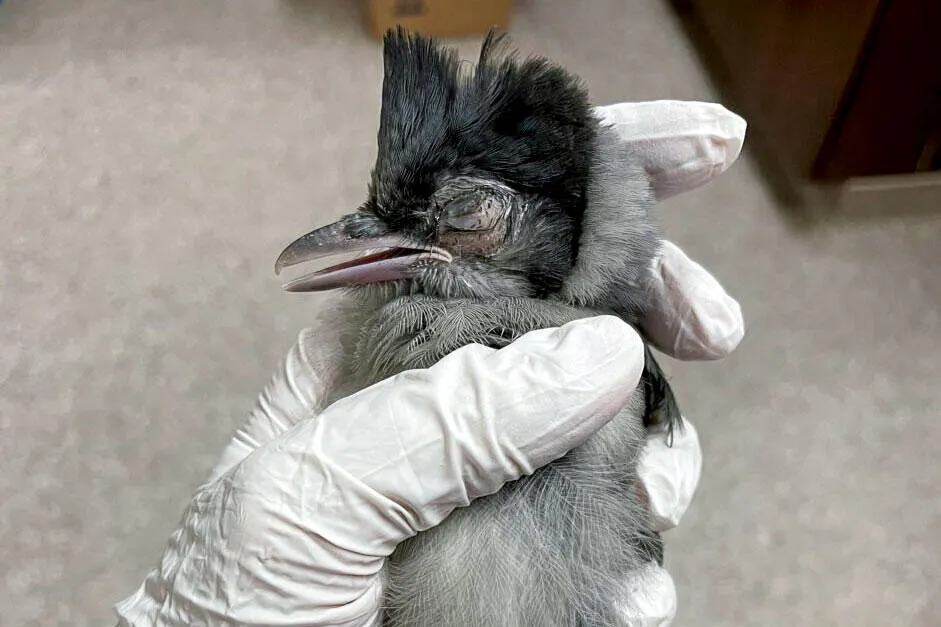As Mysterious Avian Illness Fades, Some States Give All-Clear to Feed Birds Again
It’s okay to feed songbirds again in many states, though scientists still don’t know what caused this mysterious illness
/https://tf-cmsv2-smithsonianmag-media.s3.amazonaws.com/filer/a7/16/a7163093-880d-493d-a9d4-3f2b94ba3db3/pexels-chris-f-5187221.jpg)
Just as suddenly as it appeared, a mysterious illness that sickened songbirds is subsiding. Officials in several states and the District of Columbia are saying it is safe for people to put out birdfeeders and birdbaths again.
Wildlife agencies in Virginia, Pennsylvania and several other places are reporting the unknown disease that caused weepy eyes and neurological disorders in blue jays, grackles, robins and other species is fading.
The number of reported sick or dead songbirds has dropped dramatically in recent weeks, resulting in the removal of the advisory against feeding our feathered friends as a precautionary safe-distancing step, reports naturalist David Mizejewski in a blog for the National Wildlife Federation.
“Now, there’s some good news: according to the latest update from the Cornell Wildlife Health Lab, it seems this bird mortality event is beginning to subside without significant impact to bird populations overall,” he writes.
While that is promising for bird lovers, it is perplexing to scientists, who still don’t know what caused the outbreak in ten mid-Atlantic, midwestern and southern states. Labs across the country ruled out several causes, including the bacterial infection mycoplasma, salmonella and other diseases.

“Over the course of weeks, no one was finding anything infectious,” Elizabeth Bunting, a wildlife and zoo veterinarian at the Cornell Wildlife Health Lab, says in a statement. “They did a lot of testing but could not come up with any disease process, and the rehabilitators were telling us they were trying antibiotics and things like that, but they did not have great effectiveness.”
The lack of anything infectious and the sudden decline in cases leads some scientists to suspect it may have something to do with the emergence of Brood X cicadas this year. The geographic spread and timing of the disease seems to coincide with the 17-year awakening of the bug.
“It seems likely that there’s a connection,” Mizejewski writes in his blog. “It could be some natural illness caused by ingesting cicadas or possibly secondary effects of pesticides that people sprayed on the cicadas (which is absolutely the wrong thing to do). It’s important to note, however, that this cicada connection is still just speculation.”
The removal of birdfeeders and birdbaths this spring was seen as a proactive move to protect songbirds. Scientists suspected the disease might be viral or bacterial. By asking people to refrain from using these items, it was hoped that it would slow the spread of the illness.
Now that the illness is fading, scientists are doubling down on their efforts to learn what caused it. Testing continues at research labs across the country in hopes of learning what factor—or factors—contribute to the illness.
“A cause for the sickness has not been identified,” Rachel Handel, a spokesperson for the Audubon Society of Western Pennsylvania, tells John Hayes of the Pittsburgh Post-Gazette. “Testing at the Pennsylvania Animal Diagnostic Laboratory System and New Bolton Center ruled out avian influenza, West Nile virus, Newcastle disease virus, salmonella, chlamydia, herpesviruses, poxviruses and trichomonas parasites.”
/https://tf-cmsv2-smithsonianmag-media.s3.amazonaws.com/accounts/headshot/dave.png)
/https://tf-cmsv2-smithsonianmag-media.s3.amazonaws.com/accounts/headshot/dave.png)